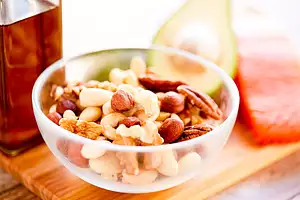Watermelon is thought to be a healthy food, one that helps to reduce the possibility of obesity as well as improve lifespan because it can help prevent diabetes and heart disease. Not only will it help you prevent certain diseases, but it can also help lead to healthier hair, clearer complexion and higher energy levels.
Nutritionally, one cup of watermelon contains only 43 calories and no fat. There are 2 grams of sodium and 11 grams of carbs (9 grams of natural sugars and one gram of fibre). This one cup of watermelon is able to provide more than 17% of the recommended amount of vitamin A, more than 20% of vitamin C, 2% of the daily amount of required iron and 1% of your daily need for calcium. As you can see, this tasty, juicy summertime treat packs a nice nutritional punch!
In addition to those nutrients, watermelon is filled with other important nutrients and minerals, including riboflavin, phosphorus, potassium, niacin, thiamin, vitamin B6, folate, selenium, manganese, pantothenic acid, copper, choline, lycopene and betaine.
In fact, watermelon actually contains more lycopene than any other fruit or vegetable, including lycopene-rich tomatoes!
Next time you want a fresh, juicy snack, reach for the watermelon! Here are just a few of the benefits that you will gain:
Asthma prevention: Eating watermelon on a daily basis may help to reduce the risk of developing asthma, and may help to reduce symptoms for asthma sufferers. The vitamin C that is so abundant contributes to this benefit.
Blood pressure control: Watermelon has been shown to reduce blood pressure in obese adults with early hypertension. Eating watermelon regularly can also improve arterial function and blood flow.
Cancer prevention: Because of the high amount of the antioxidant vitamin C, watermelon can help to fight the free radicals that are known to contribute to the development of cancer.
Improved digestion: Because watermelon is so high in water and fibre, it can help to increase regularity, improve constipation and contribute to a healthier digestive system overall.
Prevent dehydration: Watermelon is composed of more than 90% water, and also contains electrolytes, which can help to prevent dehydration—especially important during the hot summer months.
Decrease inflammation: Choline is a natural anti-inflammatory that can also improve sleep, improve muscle function, improve learning and improve memory. Additionally, choline is known to help cells transmit nerve impulses and help with fat absorption.
Help reduce muscle soreness: Because watermelon contains a certain amino acid, specifically L-citrulline, it can help to reduce muscle soreness and speed up recovery for athletes after a gruelling workout.
Clear complexion: Not only is the water in watermelon great for your skin, but the vitamin A helps keep your skin moisturized and also helps keep hair shiny and strong.
While you are enjoying summertime, reach for watermelon as a healthy snack—now that you know some of the great benefits, you should be eating it every day!
SOURCES: https://www.naturalcuresnotmedicine.com/2014/06/eating-watermelon.html;https://www.medicalnewstoday.com/articles/266886.php; Image courtesy of photomyheart / FreeDigitalPhotos.net










Comments